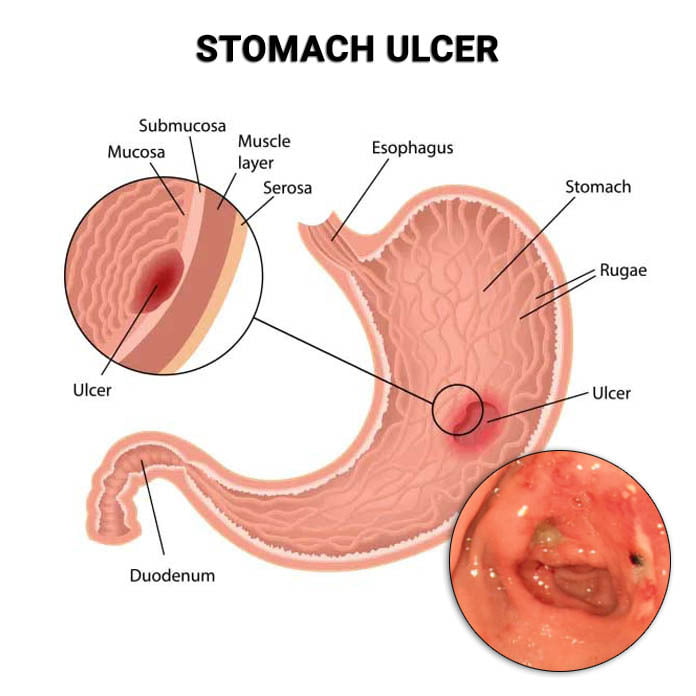
Contrary to the widespread belief among Nigerians that stomach ulcers result mainly from skipping meals or eating spicy food, health experts have pointed to a more serious culprit—Helicobacter pylori (H. pylori), a bacterium identified as the leading cause of peptic ulcers.
The infection, which is often acquired during childhood, can silently linger in the stomach for years without symptoms. In many cases, it causes chronic inflammation, which eventually erodes the stomach lining, leading to ulcers and increasing the risk of stomach cancer.
“A lot of people still think ulcers are mostly caused by stress or fasting,” said Dr. Ganiyat Oyeleke, a Consultant Gastroenterologist and Hepatologist at the Lagos University Teaching Hospital (LUTH). “But most peptic ulcers are caused by H. pylori infection.”
According to her, H. pylori possesses unique features that help it survive in the acidic environment of the stomach by hiding beneath its protective mucus layer. The bacteria damage the cells that regulate acid production, resulting in increased acidity, which further injures the stomach lining.
While ulcers caused by physical stress such as severe illness, trauma, or brain injury—known as stress ulcers—are recognised in medical literature, Dr. Oyeleke noted that these are far less common.
“Skipping meals may worsen the symptoms in someone who already has an ulcer,” she explained, “but it is not the root cause.”
Pathways of Infection
The infection is primarily transmitted through ingestion of contaminated food and water, or via oral contact with an infected person’s saliva.
“H. pylori is acquired by ingesting food and water contaminated by stool or from the saliva of an infected person,” Dr. Oyeleke said. “This is why proper hygiene practices remain crucial in preventing transmission.”
She stressed the importance of frequent hand washing, proper sanitation, safe drinking water, and responsible waste disposal in keeping the infection at bay.
The World Health Organisation’s International Agency for Research on Cancer (IARC) has classified H. pylori as a Group 1 carcinogen, underscoring its role in gastric cancer development and other severe gastrointestinal disorders.
Detecting the Infection
Diagnosis of H. pylori infection in Nigeria can be made using a variety of tests. These include blood tests to check for antibodies, stool tests for bacterial antigens, a special breath test, or direct analysis of a biopsy sample taken during endoscopy.
“Fortunately, it is a treatable condition,” said Dr. Oyeleke. “Treatment involves a specific combination of antibiotics and acid-reducing medications taken over a defined period.”
These medications not only kill the bacteria but also help heal the damage done to the stomach lining. Common symptoms of H. pylori-related ulcers include burning stomach pain, nausea, bloating, frequent burping, and in more severe cases, weight loss or vomiting of blood.
When Left Untreated
If not treated early, the infection can lead to serious and sometimes fatal complications.
“The long-term risks include chronic gastritis, gastric and duodenal ulcers, and in some cases, gastric cancer or a rare stomach lymphoma known as mucosa-associated lymphoid tissue (MALT) lymphoma,” she said.
There is also emerging evidence linking chronic H. pylori infection with conditions outside the digestive tract. According to Dr. Oyeleke, studies have shown associations with stroke, heart disease, iron-deficiency anaemia, and other systemic conditions.
The National Cancer Institute (NCI) also highlights how persistent H. pylori infection can cause long-standing inflammation that may progress to atrophic gastritis—a precursor to stomach cancer.
Staying Protected
Health experts have reiterated the importance of improving hygiene and access to clean water, especially in communities where H. pylori infection is common.
Dr. Oyeleke advised Nigerians to take ulcer symptoms seriously and seek proper diagnosis and treatment from qualified healthcare professionals.
“The infection can be prevented by personal hygiene—such as hand washing with soap and water—proper toilet practices, clean environment, access to potable water and early treatment of affected persons,” she said.
She also discouraged self-medication, warning that improper use of antibiotics can lead to drug resistance, making the bacteria harder to treat.
For many Nigerians, understanding that ulcers are not merely a consequence of lifestyle habits like skipping meals but can be caused by a preventable and treatable bacterial infection may be the first step in reducing the country’s burden of peptic ulcer disease.